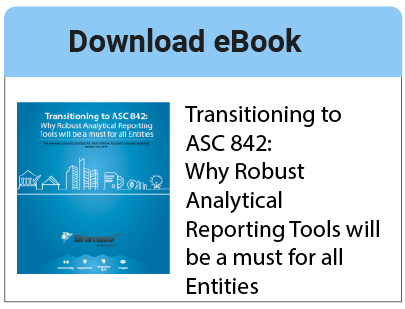Previous posts in this blog series on Environmental, Social and Governance (ESG) and carbon accounting have spotlighted carbon accounting as a trend to watch, looked at ESG impacts on M&A, and tracked the emergence of new ESG standards.
This new update focuses on the progress of regulatory requirements and software solutions for tangible accounting and reporting of ESG, along with a look at how ESG management can help drive corporate value.

Global ESG Regulatory Requirements
One of the major ESG compliance developments to watch is the US Securities and Exchange Commission (SEC) proposed regulation on Climate-Related Disclosures and ESG Investing. With a focus on assuring that companies' ESG disclosures provide accurate information, the SEC has also established an Enforcement Task Force to "to identify potential violations including material gaps or misstatements in issuers’ disclosure of climate risks".
From a global perspective, the International Sustainability Standards Board (ISSB), which was established by the IFRS in November 2021 at COP26 in Glasgow, has issued its first two standards. IFRS S1 requires companies to communicate the sustainability risks and opportunities they face over the short, medium, and long term. IFRS S2 sets out specific climate-related disclosures and is designed to be used with IFRS S1.
According to the IFRS, "IFRS S1 and IFRS S2 are built on and consolidate the TCFD recommendations, SASB Standards, CDSB Framework, Integrated Reporting Framework and World Economic Forum metrics to streamline sustainability disclosures. Consolidation will help companies to benefit from their investments they’ve already made in sustainability disclosures while reducing the ‘alphabet soup’ of sustainability disclosures."
In addition the European Union has issued regulations that require large public and private companies and all listed companies to track and disclose ESG information in accordance with the Corporate Sustainability Reporting Directive (CSRD), which became effective in January 2023. EU member states have 18 months to implement the CSRD provisions into their respective national laws. The CSRD is part of the EU’s European Green Deal and the Sustainable Finance Agenda. The CSRD is intended to revamp and expand information that was already required to be reported since 2017 under the EU’s existing Non-Financial Reporting Directive (NFRD).
While these regulatory initiatives help clarify the requirements from various entities, for US companies with global operations, it also means they will need to build up their internal ESG data collection and accounting methods to meet multiple specific reporting mandates.
Evolution of Solutions for ESG and Carbon Accounting
In parallel with the fleshing out of global compliance requirements, the evolution of software and accounting solutions for gathering, analyzing and reporting ESG data has also kicked into high gear.
As an SAP partner for over 26 years, Bramasol is closely tracking SAP's proactive actions to deliver comprehensive ESG and carbon accounting solutions.
In September 2021, the SAP Carbon Footprint solution was an early leader in enabling companies to track and manage their carbon emission impacts across both internal operations and external value chains. Integration with SAP Analytics Cloud (SAC) also allowed users to gain valuable insights into how their carbon footprints and emission mitigation plans impact other corporate activities as well as overall business results.
In November 2022, SAP took the major step of enabling companies to pull together their entire ESG landscape in a unified picture with SAP Sustainability Control Tower. This comprehensive approach was a major leap forward for end-to-end, ESG transparency and enterprise-wide sustainability management.
Key elements of the SAP Sustainability Control Tower architecture include:
- Record: Actuals instead of averages - Capturing all ESG factors with out-of-the-box integration across SAP systems for granular data visibility based on actual data.
- Report: Audit-ready sustainability metrics - Providing regulatory compliant sustainability metrics with an open and extensible solution that maps seamlessly to the requirements of multiple ESG standards and reporting mandates.
- Act: Sustainability embedded in business processes - setting actionable targets, monitoring and improving progress, and driving sustainability impacts at scale.
At Sapphire 2023, SAP also introduced a new component called the Sustainability Data Exchange within the SAP Business Network.
As part of SAP's green ledger initiative, the Sustainability Data Exchange application allows companies to request and exchange carbon data across supply chains, including sharing of actual Scope 3 product carbon footprints. The solution utilizes carbon data interoperability standards established by the Partnership for Carbon Transparency (PACT), which allows different emissions and accounting technology solutions to connect and share information.
In our extensive work with companies on implementing subscription-based Digital Solutions Economy (DSE) business initiatives, the Bramasol team is seeing increasingly more need for quantifying and managing end-to-end sustainability requirements across complex, multi-faceted, bundling, partnering, licensing and delivery scenarios.
Driving Corporate Value with ESG
Overall, it is important to remember that ESG accounting is not just about ticking boxes on a checklist; it requires a genuine commitment to sustainability and a long-term perspective. By prioritizing ESG and adopting proactive strategies, large enterprises can enhance their reputation, resilience, and value in an increasingly ESG-focused business landscape.
Some of the tangible benefits of a robust ESG sustainability program include:
- Top-line Revenue Growth - by attracting customers and partners with more sustainable products and services that meet their growing demand for environmentally responsible corporate offerings.
- Cost Reduction - by achieving lower energy, water and materials cost and avoiding wasteful manufacturing, packaging and shipping practices.
- Employee Commitment and Productivity - by boosting motivation, attracting talent, and enhancing corporate culture around shared commitment to environmental excellence.
- Leveraging Regulatory Compliance - by attracting investment from funds and individuals who view ESG as a core value and by avoiding fines and sanctions.
Summary
As both the global regulatory environment and the breath of sustainability management and accounting solutions continue to evolve, the drive toward Net-Zero emissions and achieving a "Green Bottom Line" have become much more than just compliance issues.
As articulated by the Climate Action organization, the five key sustainability goals for companies of all sizes should include:
- Establish a Sustainable Business Strategy
- Embed Sustainable Business Data into Processes and Networks
- Manage Carbon and Climate Exposure Throughout the Business
- Embrace Circularity and Become Regenerative
- Prioritize People Across Your Value Chain
The future of our planet and quality of life for global populations hang in the balance.
For more information, check out these resources:

.png?width=3121&name=MicrosoftTeams-image%20(33).png)


